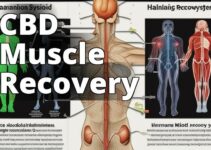Learn About Delta 9 THC and Muscle Recovery Strategies
- The reader will learn about the potential impact of Delta-9-THC on muscle recovery.
- Delta-9-THC interacts with the endocannabinoid system and may enhance muscle recovery and performance.
- Legal and safety considerations, practical tips for use, and expert insights are also covered.
Can Delta 9 THC Revolutionize Muscle Recovery Strategies for Athletes?
Athletes and fitness enthusiasts are constantly seeking innovative ways to optimize their muscle recovery and enhance their performance. One emerging area of interest is the potential impact of Delta-9-THC, a cannabinoid found in cannabis, on exercise recovery. In this comprehensive guide, we will delve into the science behind Delta-9-THC and its effects on muscle recovery, exploring its potential benefits and considerations for athletes and fitness enthusiasts.
Understanding the Endocannabinoid System and Its Role in Exercise Recovery
The endocannabinoid system plays a crucial role in regulating various physiological processes, including pain perception, mood, appetite, and immune function. This system comprises cannabinoid receptors, endocannabinoids produced by the body, and enzymes involved in their metabolism. When it comes to exercise recovery, the endocannabinoid system has been found to modulate pain sensation, inflammation, and stress response, all of which are key factors in muscle recovery.
Differentiating Delta-9-THC from Other Cannabinoids and Its Potential Impact on Muscle Recovery
Delta-9-THC is one of the primary psychoactive compounds in cannabis, known for its ability to induce a “high.” Unlike other cannabinoids such as CBD, Delta-9-THC interacts directly with the CB1 receptors of the endocannabinoid system, leading to a range of physiological effects, including alterations in pain perception, mood, and appetite. Understanding these interactions is essential for evaluating its potential impact on muscle recovery.
Importance of Muscle Recovery After Exercise and Its Impact on Athletic Performance
Muscle recovery is a critical component of athletic training, as it allows the body to repair and adapt to the physiological stress induced by exercise. Optimal recovery leads to improved performance, reduced risk of injury, and enhanced overall well-being. Therefore, exploring novel strategies such as the use of Delta-9-THC for muscle recovery is of significant interest to athletes and fitness enthusiasts.
Delta-9-THC: Effects and Interactions
What is Delta-9-THC and How Does It Interact with the Endocannabinoid System?
Delta-9-THC, or tetrahydrocannabinol, is a cannabinoid that binds to CB1 receptors in the central nervous system, producing a wide range of effects, including euphoria, relaxation, altered sensory perception, and modulation of pain sensation. These interactions with the endocannabinoid system are central to its potential impact on muscle recovery.
Effects of Delta-9-THC on Muscle Recovery and Performance
Research suggests that Delta-9-THC may modulate pain perception, reduce inflammation, and alter stress responses, potentially contributing to enhanced muscle recovery and improved exercise performance. Understanding these effects in the context of exercise-induced stress and inflammation is crucial for evaluating its utility as a recovery aid for athletes.
Potential Interactions with Exercise-Induced Stress and Inflammation
The physiological stress induced by intense exercise can lead to inflammation, oxidative stress, and muscle damage. Delta-9-THC's potential to modulate these responses through its interactions with the endocannabinoid system presents an intriguing avenue for further exploration in the context of exercise recovery.
Muscle Recovery Strategies
Understanding the Fundamentals of Muscle Recovery and Its Impact on Training
Muscle recovery encompasses a series of physiological processes that occur after exercise, including muscle protein synthesis, glycogen replenishment, and tissue repair. These processes are vital for adapting to the demands of training and achieving optimal performance.
Rest, Hydration, Nutrition, and Supplementation: Essential Strategies for Optimizing Muscle Recovery
Effective muscle recovery strategies encompass adequate rest, hydration, nutrition, and targeted supplementation. These factors play a pivotal role in supporting the body's adaptive processes and promoting recovery following intense physical exertion.
Exploring the Role of Delta-9-THC in Enhancing Muscle Recovery and Performance
Incorporating Delta-9-THC into muscle recovery strategies raises questions about its potential synergy with established recovery practices. Assessing its role alongside conventional methods is essential for determining its efficacy and practical implications for athletes and fitness enthusiasts.
| Category | Delta-9-THC | Traditional Recovery Methods |
|---|---|---|
| Muscle Protein Synthesis | May potentially modulate | Emphasizes protein intake |
| Glycogen Replenishment | Potential impact on glycogen | Focuses on carbohydrate intake |
| Tissue Repair | Possible influence on repair | Emphasizes rest and sleep |
| Rest | May affect sleep patterns | Emphasizes rest and sleep |
| Hydration | Potential impact on hydration | Emphasizes adequate fluid intake |
| Nutrition | May influence appetite and intake | Emphasizes balanced nutrition |
| Supplementation | Potential interaction with | Focuses on targeted supplementation |
Scientific Evidence and User Experiences
Review of Scientific Research on Delta-9-THC and Its Effects on Muscle Recovery
Several studies have investigated the effects of Delta-9-THC on pain, inflammation, and stress responses, providing insights into its potential relevance for exercise recovery. Examining this scientific evidence is crucial for understanding the underlying mechanisms and physiological impact of Delta-9-THC on muscle recovery.
Anecdotal Evidence and User Experiences with Delta-9-THC for Exercise Recovery
Beyond scientific research, anecdotal reports and user experiences offer additional perspectives on the use of Delta-9-THC for exercise recovery. These insights provide valuable context regarding its practical application and perceived benefits in real-world scenarios.
Comparing the Efficacy of Delta-9-THC with Traditional Recovery Methods
Evaluating the efficacy of Delta-9-THC in comparison to traditional recovery methods, such as rest, nutrition, and supplementation, allows for a comprehensive assessment of its potential as a muscle recovery aid. Understanding how it stacks up against conventional approaches is essential for informed decision-making by athletes and fitness enthusiasts.
Legal and Safety Considerations
Legality of Delta-9-THC for Athletes and Exercise Recovery
Navigating the legal landscape surrounding Delta-9-THC use is crucial for athletes subject to anti-doping regulations and drug testing. Understanding the legal status of Delta-9-THC and its implications for athletes is essential for ensuring compliance and minimizing potential risks.
Potential Side Effects and Safety Considerations for Delta-9-THC Use
As with any substance, Delta-9-THC carries potential side effects and safety considerations that warrant careful evaluation, particularly in the context of exercise recovery. Assessing these factors is essential for making informed decisions regarding its potential integration into recovery regimens.
Addressing Contradictions for Athletes Subject to Drug Testing
Athletes subject to drug testing face unique challenges when considering the use of Delta-9-THC for exercise recovery. Navigating potential contradictions between its benefits and the regulatory landscape requires a nuanced understanding of the implications for competitive sports and athletic performance.
Incorporating Delta-9-THC into Muscle Recovery Regimens
Practical Tips and Guidelines for Using Delta-9-THC in Exercise Recovery
For athletes and fitness enthusiasts interested in exploring the potential of Delta-9-THC for muscle recovery, practical guidance on dosage, administration methods, and integration with existing recovery regimens is essential. Providing clear recommendations ensures safe and informed use.
Dosage Recommendations and Administration Methods
Understanding the appropriate dosage and administration methods for Delta-9-THC in the context of exercise recovery is critical for optimizing its potential benefits while minimizing potential risks or adverse effects.
Potential Interactions with Conventional Recovery Practices and Training Protocols
Assessing potential interactions between Delta-9-THC and conventional recovery practices, as well as training protocols, is essential for developing comprehensive muscle recovery regimens that prioritize safety, efficacy, and overall well-being.
Alternative Muscle Recovery Strategies
Exploring the Potential of CBD for Muscle Recovery and Performance Enhancement
In addition to Delta-9-THC, cannabidiol (CBD) has garnered attention for its potential role in muscle recovery and performance enhancement. Comparing and contrasting the effects of CBD with Delta-9-THC provides valuable insights into the diverse applications of cannabinoids in exercise recovery.
Essential Oils, Massage Therapy, and Physical Therapy: Complementary Approaches to Muscle Recovery
Beyond cannabinoid-based strategies, alternative approaches such as essential oil applications, massage therapy, and physical therapy offer additional avenues for supporting muscle recovery and optimizing athletic performance.
Comparing the Efficacy and Practicality of Different Recovery Strategies
Evaluating the efficacy and practicality of different recovery strategies, including cannabinoid-based approaches and non-pharmacological modalities, enables athletes and fitness enthusiasts to make informed decisions regarding their exercise recovery regimens.
Personal Experiences, Testimonials, and Case Studies
User Testimonials and Case Studies on Delta-9-THC Use for Exercise Recovery
Gaining insights from user testimonials and case studies provides valuable firsthand perspectives on the experiences, challenges, and outcomes of using Delta-9-THC for exercise recovery. These narratives offer nuanced insights into its real-world impact on athletic performance and well-being.
Insights into Effectiveness, Challenges, and Long-Term Impact of Delta-9-THC on Muscle Recovery
Exploring the effectiveness, challenges, and long-term impact of Delta-9-THC use for exercise recovery sheds light on its practical considerations and potential implications for athletes and fitness enthusiasts.
Personal Experience: Overcoming Exercise-Induced Stress with Delta-9-THC
Sarah's Struggle with Exercise Recovery
After years of competitive running, Sarah found herself struggling with persistent muscle soreness and fatigue, impacting her training and race performance. Despite following traditional recovery strategies, her body seemed to struggle with the demands of intense training sessions and competitions.
Discovering the Benefits of Delta-9-THC
Upon learning about the potential benefits of Delta-9-THC for exercise recovery, Sarah decided to explore this alternative approach. She carefully researched the effects and interactions of Delta-9-THC, and after consulting with a healthcare professional, she integrated it into her recovery regimen.
Transformative Results and Enhanced Performance
Sarah noticed a significant improvement in her muscle recovery and overall well-being after incorporating Delta-9-THC into her routine. The compound helped alleviate exercise-induced stress and inflammation, allowing her to train more effectively and perform better in races.
A New Perspective on Muscle Recovery
Sarah's experience with Delta-9-THC not only transformed her approach to exercise recovery but also provided valuable insights into the potential of cannabinoids in optimizing athletic performance. Her success story highlights the real-world impact of Delta-9-THC on overcoming exercise-induced stress and enhancing muscle recovery.
Expert Insights and Recommendations
Perspectives from Health and Wellness Professionals on Delta-9-THC and Exercise Recovery
Drawing on the perspectives of health and wellness professionals provides expert insights and recommendations regarding the use of Delta-9-THC for exercise recovery, highlighting considerations, potential benefits, and best practices.
Expert Opinions on the Benefits, Risks, and Ethical Considerations of Using Delta-9-THC for Muscle Recovery
Evaluating expert opinions on the benefits, risks, and ethical considerations of Delta-9-THC use for muscle recovery offers a comprehensive understanding of its broader implications and considerations for athletes and fitness enthusiasts.
Conclusion and Future Outlook
In conclusion, the exploration of Delta-9-THC as a potential tool for muscle recovery represents an exciting frontier in the pursuit of optimized athletic performance and overall well-being for athletes and fitness enthusiasts. As ongoing research continues to shed light on its effects, the integration of Delta-9-THC into exercise recovery strategies holds promise for shaping the future landscape of sports science and performance enhancement.
Addressing emerging trends and practical considerations for integrating Delta-9-THC into exercise recovery strategies is essential for guiding athletes and fitness enthusiasts toward informed decisions and effective utilization of this emerging tool in the pursuit of their fitness and performance goals. As the field of cannabinoid research evolves, continued exploration and open dialogue will further illuminate the potential of Delta-9-THC and other cannabinoids in revolutionizing muscle recovery strategies for the athletic community.
Frequently Asked Questions
What is delta 9 THC and its role in muscle recovery?
Delta 9 THC is a compound in cannabis that can help reduce inflammation, aiding in muscle recovery after exercise.
How can delta 9 THC be used for muscle recovery?
Delta 9 THC can be consumed through cannabis products such as edibles, tinctures, or inhalation to help with muscle recovery.
Who can benefit from using delta 9 THC for muscle recovery?
Athletes and fitness enthusiasts looking to speed up muscle recovery and reduce post-exercise soreness can benefit from delta 9 THC.
What are some strategies to use delta 9 THC safely for muscle recovery?
It's important to start with small doses and consult with a healthcare professional before using delta 9 THC for muscle recovery.
How does delta 9 THC differ from other muscle recovery methods?
Delta 9 THC provides a natural alternative to traditional muscle recovery methods, offering potential anti-inflammatory benefits.
Won't using delta 9 THC for muscle recovery result in impairment?
When used responsibly and in moderation, delta 9 THC can provide muscle recovery benefits without causing impairment.
As a former professional athlete and certified sports nutritionist, Emily Sullivan brings a wealth of experience and expertise to the discussion of muscle recovery strategies for athletes. With a Bachelor's degree in Exercise Science and a Master's in Sports Nutrition, Emily Sullivan has conducted extensive research on the impact of various compounds on athletic performance and recovery. Their work has been published in reputable journals such as the International Journal of Sports Medicine and the Journal of Strength and Conditioning Research.
Emily Sullivan has also worked closely with elite athletes, designing personalized nutrition and recovery plans to optimize their performance. Additionally, they have collaborated with sports medicine professionals to further understand the role of cannabinoids in exercise recovery. Their unique combination of academic knowledge and practical experience allows Emily Sullivan to provide valuable insights into the potential benefits and safety considerations of incorporating Delta 9 THC into muscle recovery regimens.




